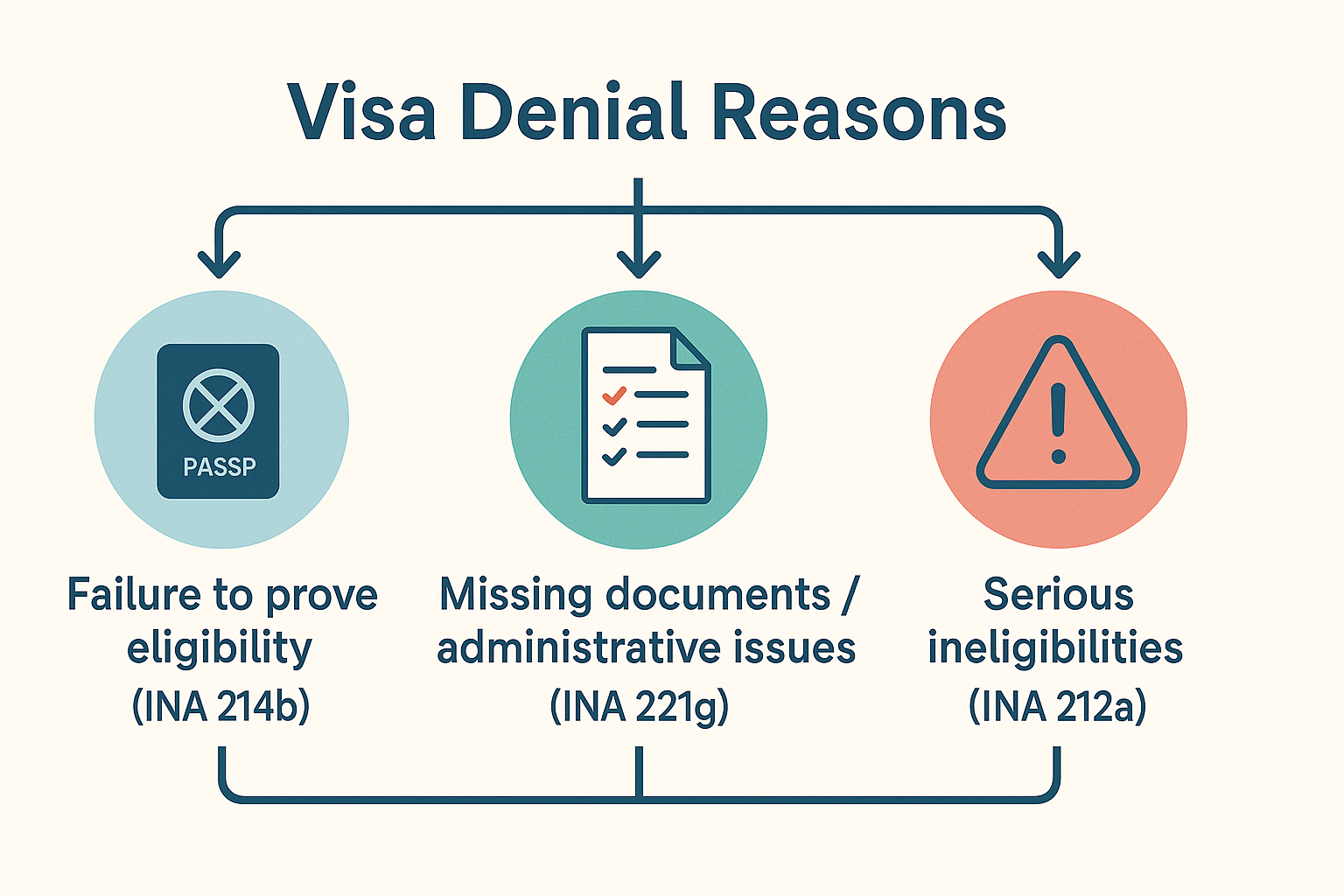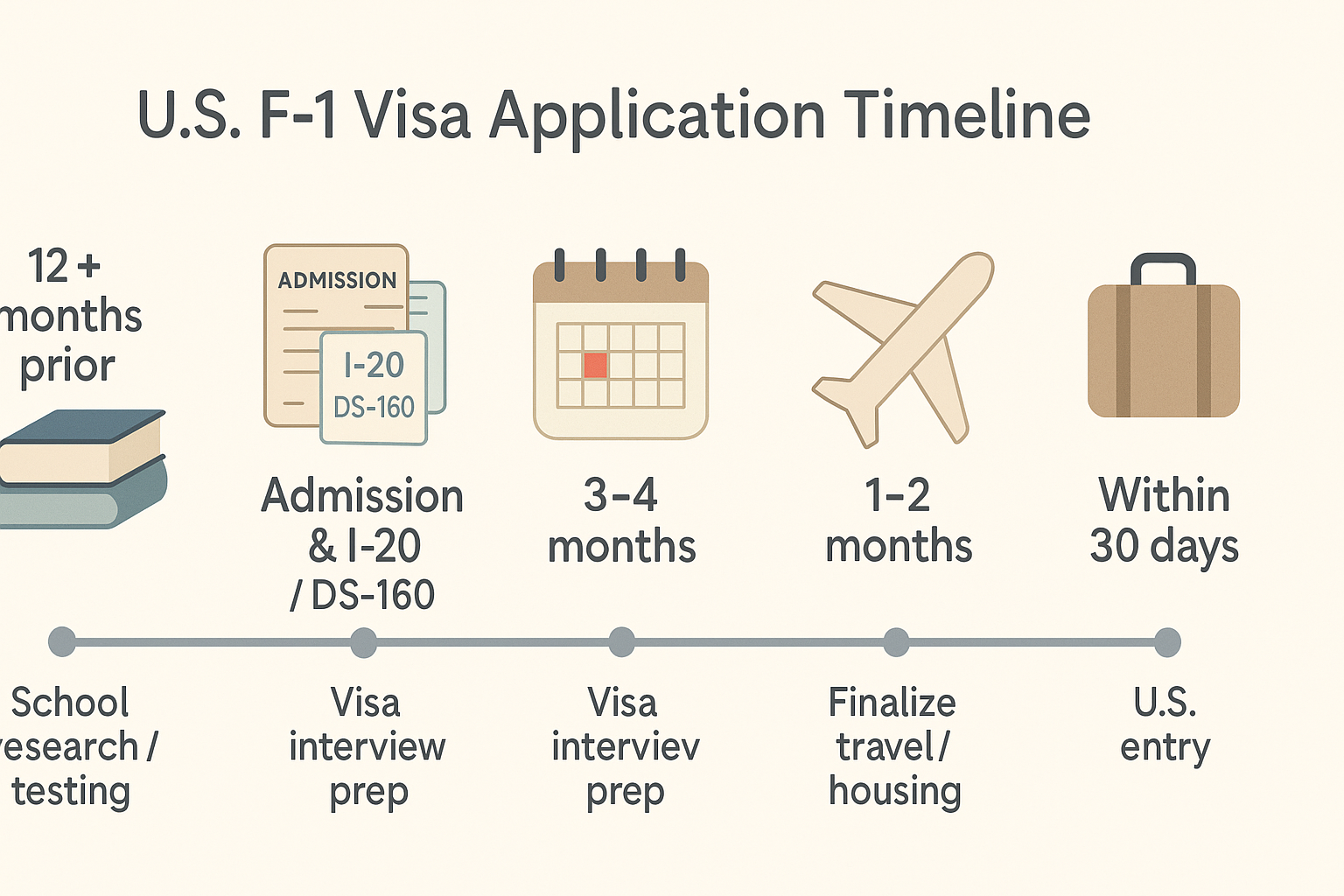Last-Minute Visa USA Denials? How to Rescue Your Application Before It’s Too Late

Last-Minute US Visa Denials? How to Rescue Your Application Before It’s Too Late
Imagine this scenario: You’re poised for a crucial business trip, or your child’s semester at a top US university is about to start—flights are booked, plans are set—and suddenly your US visa is denied at the last minute. For expats in Dubai or high-net-worth individuals, a last-minute “visa refused” stings and disrupts major plans.
You’re not alone: in 2023, the overall US visa refusal rate was nearly 19.2% (over 2.4 million applications), and even historically high-approval countries saw surges in denials. But a refusal isn’t the end. With the right approach—timely, strategic action—you can turn things around.
This guide explains how to appeal a US visa refusal (especially from Russia or Dubai), what emergency documents matter most, how to fast-track your interview, when legal help is wise, and how to avoid common mistakes so you never face a last-minute denial again.
Why Was Your US Visa Denied at the Last Minute?
Understanding the “why” behind your visa denial is crucial for a targeted response. US visa refusals typically fall into two categories:
1. Failure to Meet Visa Requirements or Prove Eligibility
The most common basis is failing to convince the consular officer you qualify—especially under INA section 214(b), which presumes every applicant is an intending immigrant unless proven otherwise. You must show strong ties to your home country (job, property, family) that will compel your return after your US visit. If your interview or documents fall short, a 214(b) refusal is issued. This isn’t permanent, but you can’t appeal it—you must reapply with new evidence.
2. Missing Documents or Administrative Issues
Another common last-minute refusal is under INA section 221(g), which means your application was incomplete or needs further administrative processing (like a security clearance). The officer issues a 221(g) notice listing the missing items. Your case stays open for up to a year; if you supply the missing documents quickly, your visa can still be approved without a new application.
3. Serious Ineligibilities
Less often, denials are due to serious issues under Section 212(a) (criminal records, immigration violations, security concerns), which usually require a formal waiver to overcome.
Bottom line: US visa denials almost always boil down to insufficient proof of eligibility/intent or paperwork errors. Your refusal letter will cite the reason and legal code—this determines your next step.
How to Appeal a US Visa Refusal from Russia or Dubai
After a denial, the key question is: Can I appeal? For US non-immigrant visas (tourist, business, student), there’s no formal appeals process—you must reapply. Here’s how to do it smartly:
1. Identify the Reason
Read your refusal notice. If it’s 214(b) (common for Russians, Indians, and expats in Dubai), you must reapply with a new DS-160 form, pay the fee again, and book a new interview—but only if you have new evidence or a change in your situation.
If it’s 221(g), supply the required documents as instructed; you don’t need to start over.
2. Decide Where to Reapply
- Russian passport holders: Since US consular services in Russia are limited, most successful applicants reapply in third countries (Dubai, Abu Dhabi, Istanbul, etc.).
- Dubai-based expats (e.g., Indian nationals): Reapplying in Dubai or Abu Dhabi is common and advantageous, especially if you have UAE residency. Local consulates have lower wait times and high approval rates.
Tip: Apply in your country of legal residence for best results.
3. Don’t Rush—Address the Issue
Don’t reapply immediately with the same information. Assess why you were refused, and gather new or better evidence to address the officer’s concerns.
4. Write an Explanatory Letter
Prepare a concise cover letter for your next interview. Acknowledge the prior refusal, and point out what’s new (e.g., new employer letter, more financial evidence). Be honest—officers will see your refusal in their system.
5. Use Local Resources
Contact the US visa information service (e.g., USTravelDocs in the UAE) for guidance, and consider reputable visa consultants for interview preparation.
In summary: “Appealing” means improved, timely reapplication with stronger evidence. Don’t repeat the same mistakes—correct and clarify.
Emergency Documents Needed for US Visa Reapplication
After a denial, what you bring next time can change everything. Here’s a focused checklist for emergency reapplication:
1. Proof of Strong Ties
- Financial: Updated bank statements, property deeds, investment portfolios, UAE property or lease.
- Professional: Employer letter confirming your position, salary, leave dates, and expectation of return; business owners should include trade licenses and operational proof.
- Family/Social: Documents showing spouse/kids remain in UAE or home country, children’s school enrollment.
2. Previous Travel Evidence
Bring old passports, showing previous visas and responsible returns (especially to the US, Schengen, UK, Canada, etc.).
3. Invitation or Event Documents
- Business: Invitations from US companies or conference organizers, highlighting urgency.
- Family/Medical: Graduation invitations, hospital/doctor’s letters, or proof of urgent events.
4. Corrected/Additional Forms
Re-do the DS-160 if there were errors, highlight corrections, and bring supporting explanations.
5. Emergency Appointment Evidence
- Medical: Doctor/hospital letters (US and local).
- Funeral: Death certificates, proof of relationship.
- Urgent business: Letters from US companies explaining the necessity.
6. Legal and Identity Documents
Current, valid passport; visa fee receipt; new interview confirmation; previous refusal letter.
7. Travel Insurance (Optional)
Not required, but can demonstrate preparation, especially for older or health-risk applicants.
Organize all documents for quick access in your interview. Focus on evidence that addresses your original refusal reason.
Fast-Track US Visa Interview Scheduling Options
Time is critical after a denial. Here’s how to speed up your next chance:
1. Expedited (Emergency) Appointment Requests
US embassies offer “expedited appointments” for true emergencies:
- Medical emergency: Immediate family needs urgent care in the US.
- Funeral/death: Attend or arrange a family funeral.
- Urgent business: Unforeseen, critical meetings (with strong documentation).
- Students: Program start is very soon and no normal appointments are available.
Apply online after booking the earliest normal slot. Supply concise, truthful justification—misrepresenting an emergency can hurt future applications.
2. Monitor for Open Slots
Check the appointment system frequently—others’ cancellations can open spots suddenly.
3. Try Alternate Locations
If the UAE has multiple posts (Dubai, Abu Dhabi), check both. Some expats travel to third countries to get faster interviews, but be ready to explain ties to the country where you apply.
4. Premium Concierge Services
Some agencies offer slot monitoring and appointment booking, helpful if you’re short on time and need expert assistance.
5. Be Ready
Prepare all documents and rehearse your interview answers—an earlier slot can appear on short notice.
Note: Not all urgent reasons qualify. Weddings and last-minute tourism do not count as emergencies.
Legal Help for Urgent US Visa Denial Cases
When the stakes are high, professional help is invaluable. Here’s how lawyers and consultants add value:
1. Personalized Case Analysis
A legal expert reviews your DS-160, interview experience, and refusal reason to diagnose issues. For complex cases (multiple residencies, business interests), they help clarify your story.
2. Customized Reapplication Strategy
They advise on what evidence to strengthen, when to reapply, and draft effective explanations or cover letters.
3. Interview Coaching
Mock interviews help you practice and refine your answers, especially addressing red flags from your previous attempt.
4. Legal Advocacy
For complex ineligibilities or consular errors, attorneys can sometimes request reviews or help with waivers (for serious issues like criminal records or overstays).
5. Concierge Support
Premium consultants handle logistics—scheduling, paperwork, translations, payments—so you can focus on work and family.
6. Policy Monitoring
Professionals stay up-to-date on the latest rules and trends, adapting your strategy to current consular practices.
Case Example:
An Indian business owner in Dubai was denied under 214(b). With legal help, he gathered proof of business ties and commitments in Dubai, practiced his interview, and was approved in time for his US conference.
Engage expert help—one well-prepared reapplication is better than repeated, rushed failures.
Tips for Avoiding Common Mistakes in US Visa Forms
Preventing a denial is easier than fixing one. Here’s how to get it right the first time:
1. Scrutinize the DS-160 Form
- Typos: Ensure names, passport numbers, and dates match exactly with your documents.
- Consistency: Cross-check employment history, travel dates, and all answers for logic.
- Completeness: List full five-year histories, prior visa fundings/refusals, and avoid blank fields.
- Photos/Signatures: Use correct photo size, and sign all required forms.
2. Don’t Book Non-Refundable Travel
Buying non-refundable tickets before visa issuance is risky—it doesn’t influence the officer and can add stress.
3. Avoid Last-Minute Rush
Start your application months in advance. If forced to apply late, double your attention to detail or seek expert help.
4. Prepare for the Interview
- Concise Answers: Be direct, truthful, and avoid over-explaining.
- Confidence: Know your own details, purpose, and finances.
- No Arguments: Stay courteous, clarify questions, and never argue.
5. Bring Supporting Documents
Bring your organized binder—even if not asked, it shows preparation and can help clarify answers.
6. Peer Review
Have someone else review your application and conduct a mock interview.
7. Stay Informed
Keep up with the latest requirements (e.g., social media disclosures).
Frequently Asked Questions (FAQ)
Q: Can you appeal a US visa refusal from Dubai or Russia?
A: Not directly. For most visas, you must reapply with new evidence. Russians often reapply in third countries due to limited services at home.
Q: How soon can I reapply?
A: Immediately, but it’s best to pause, strengthen your application, and correct any errors or weaknesses before rebooking.
Q: What are my chances on a second try?
A: Much better if you directly address the first refusal’s reason. Repeat applications with no changes almost always fail.
Q: What if my denial was for criminal record or overstay?
A: Consult an immigration lawyer. These require waivers, which take time and legal expertise.
Q: Are there emergency visa options for immediate travel?
A: Expedited appointments are possible, but only for genuine emergencies. Plan realistically.
Q: Does UAE residency help?
A: Yes—ties to UAE count and consulates are accustomed to expat applicants. You must still prove intent to return.
Q: What if I’m denied again?
A: Consult a professional for a deep review and wait for significant changes before reapplying.
Conclusion: Rescue Your Visa and Move Forward
A last-minute US visa denial is disruptive, but with the right actions, it’s not fatal. By quickly understanding the refusal, gathering targeted documents, pursuing fast-track appointments, engaging legal help as needed, and avoiding common errors, you can turn setbacks into approvals. Many expats and business professionals have overcome last-minute denials—preparation and persistence are key.
Your next step: Don’t leave your global plans to chance. If you’re grappling with a refusal or a tight deadline, consult experts for tailored strategies and support. The right guidance can secure your US visa in time for your critical trip or event. For urgent assistance or to explore fast-track options, visit our USA urgent visa service page for more information. Contact Us
Act now—with preparation and the right help, your US journey is still within reach. Safe travels!



